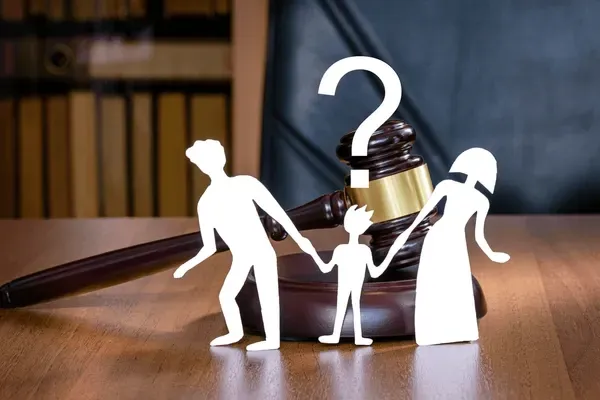Why You Shouldn’t Divorce Before Settling Marital Property
March 10, 2020
Settling Marital Property During a Divorce
Among the many challenges that come with divorce, property distribution ranks second only to child custody and child support in terms of the emotional toll it takes on everyone involved. To help make things easier for you and your soon-to-be ex, here is a brief overview of the rules on property distribution in North Carolina.

Who Makes the Decisions on Property Distribution?
Oftentimes, the parties to a divorce proceeding agree on property distribution
themselves in the form of a property settlement. Where that is not possible, the court steps in. A judge will guide the parties through a number of steps in a process known as “equitable distribution” (ED).
Equitable Distribution Explained
The parties’ rights to ED arise at the time of their separation. These rights, however, are not automatic. One or both parties must assert them by making a formal application to the court. They can do so at any time after the separation in the form of either:
- A separate ED action;
- Together with another application under Chapter 50; or
- As a motion in the cause.
The court will then determine which property classifies as marital and which doesn’t and will distribute the former in an equitable manner. The final judgment may be rendered either before or after the divorce is finalized, at the discretion of the judge. If the judgment is with the consent of both parties, they may agree for it to enter into force prior to the divorce.
The Courts’ Approach to ED
When distributing marital property, the judge will carry out a three-step analysis. First, they will separate marital from non-marital property. Note that marital property includes not only real estate but also any debts and assets. Then, the judge will issue an order distributing the marital property. The order may or may not include written findings of fact that support the judge’s determination as to why the division of property is equitable.
Defenses Against Equitable Distribution
Divorce
Except for two special provisions, an absolute divorce will ban any ED claim that was not pending at the time the divorce was finalized. That has been interpreted quite strictly in case law.
Property Settlement
Another common defense to ED is the prior execution of a valid and comprehensive property settlement that either divides the property or otherwise releases the parties’ right to ED. That goes for property settlements entered into at the time of separation as well as premarital and postnuptial agreements.
Previously, reconciliation between the parties would void the executory or unperformed property provisions of a separation agreement. Nowadays, however, the courts differentiate between separation agreements proper and standard property distribution contracts. The former have the separation as their primary focus, while the latter are unrelated to whether or not the parties reconcile. As a result, reconciliation only voids the agreement where the intent and language of the contract clearly indicate that property rights depend on separation.
Death of One of the Parties
Depending on when it takes place, the death of one of the parties may significantly affect an ED claim. If the spouse dies prior to the entry into force of an absolute divorce but while an ED claim is pending, that will bar the ED.
However, if the spouse dies while an ED claim is pending but a divorce has already been granted, that will not bar the ED. In that case, any heirs and the executor or administrator of the deceased’s estate become joint parties to the action. Failure to join the heirs shall void any property sale as to those heirs.
Conflicting Federal Law
In some cases, federal law may preempt the state’s right to execute ED of certain types of marital property. For instance, anti-assignment and other provisions in federal social security law bar North Carolina courts from distributing social security benefits. Furthermore, the Supreme Court found that state courts may not distribute retirement pay to servicemen as either marital or community property, where they waived it in favor of veteran disability benefits.
Military Pay Protections
The Court of Appeals recently held that military disability payments do not fall under the federal definition of “disposable retired or retainer pay.” Therefore, such payments do not classify as marital property and may not be distributed by state courts pursuant to ED claims.
In contrast, however, the Court of Appeals found that disposable servicemen retirement pay is subject to equitable distribution under federal law, as per the Uniformed Services Former Spouses’ Protection Act
and GS 50-20(b)(1), which restricts distribution only to “eligible” military pensions. That finding was consistent with an earlier judgment of the Supreme Court.
How to Prevent Property from Disappearing
It is not uncommon for a party to a divorce to try to hide, waste, or convert alleged marital property to avoid its equitable distribution by the court.
Fortunately, there exist special statutory provisions that allow the other party to obtain injunctive relief and temporary orders to prevent marital property from disappearing. Parties can apply for injunctive relief either before or after the filing of the ED action.
Alternatively, a party to a divorce may apply for an order for the partial distribution of marital property. However, parties may do so only after the ED action has been filed.
Collecting Legal Fees in ED Actions
Typically, a party to an ED action may not recover legal fees from the other party. The only exception is where the court allows, at its discretion, the award of reasonable legal fees and costs to a party that:
- Owns separate property; and
- Sues the other party to regain possession of the said property.
The above also applies where the other party removed the property in question from the marital home.
To Conclude
This brief note serves only as a general overview and introduction to the marital property distribution rules in North Carolina. The information contained here is not all-inclusive, and different rules may apply depending on the circumstances of each case. For more details, interested parties should review the relevant property distribution statutes and seek expert legal advice.

When one or both spouses own a business, divorce often involves additional legal and financial challenges. Whether the business is a closely held company, professional practice, family enterprise, or side venture, it often represents years of effort and can quickly become one of the most contested issues in a divorce.

Family law cases are among the most emotionally challenging legal experiences a person can face. Beyond the paperwork and court dates, there’s a deep emotional toll that comes with major life changes involving your family, children, and future. At Russell Family Law & Litigation, we understand that family law isn’t just about legal outcomes – it’s about people, healing, and moving forward. Here are some strategies to help you cope with the emotional side of your case while protecting your mental and emotional well-being. 1. Acknowledge What You’re Feeling It’s completely normal to feel overwhelmed, angry, anxious, or even numb during a family law case. Whether you’re ending a marriage or navigating a custody issue, you’re dealing with loss, change, and uncertainty. Give yourself permission to feel whatever comes up. Suppressing emotions can make the process even harder. 2. Focus on What You Can Control So much of the legal process can feel, and in reality is, outside your control - the court’s schedule, your ex-partner’s actions, or the pace of negotiations. Instead of fixating on what you can’t change, try to focus on what you can , including: How you respond to stress How you communicate with your attorney and their team How you care for your physical and mental health Keeping your attention on small, manageable steps can help reduce some of the inevitable anxiety. 3. Build a Strong Support System Don’t try to go through this alone. Surround yourself with people who can offer emotional support. Speaking with a licensed counselor or therapist can be especially helpful. They can provide tools for managing anger, grief, or anxiety in a healthy way and give you a safe space to process what’s happening with a neutral third party. 4. Take Care of Your Physical Health Emotional stress often takes a physical toll. Eating well, getting enough rest, and staying active can make a significant difference in how you handle the challenges ahead. Even simple habits like walking daily or journaling before bed can help reduce stress and improve your emotional balance. 5. Keep Perspective on the Future It’s easy to feel like your current situation will never end, but family law cases are temporary chapters in your life. Eventually, the legal process concludes, and you’ll have a new foundation to rebuild from. Try to focus on your long-term goals and remember that each small step forward is progress. 6. Lean on Your Attorney for Guidance A compassionate, experienced family law attorney doesn’t just handle the legal side – they can also help you navigate the process with clarity and confidence. At Russell Family Law & Litigation, we take the time to listen, explain your options, and ensure you never feel alone in this process. Knowing that your case is in capable hands can ease much of the stress and uncertainty you may be feeling. If you’re struggling with a divorce, custody matter, or other family law issue, our team at Russell Family Law & Litigation is here to provide both the legal skill and empathetic support you need. Contact us today to schedule a confidential consultation and take the next step toward peace of mind.

When parents live in different states, co-parenting can feel like an uphill battle. Coordinating schedules, maintaining strong relationships with children, and following custody orders across state lines all require careful planning and often, legal guidance. At Russell Family Law & Litigation, we understand how challenging long-distance parenting can be. Whether your move is due to a job, remarriage, or personal reasons, maintaining a healthy, consistent relationship with your child is absolutely possible. Here’s how to make interstate custody arrangements work smoothly for everyone involved. 1. Understand the Legal Framework Custody issues across states are governed by the Uniform Child Custody Jurisdiction and Enforcement Act (UCCJEA). This statute helps determine which state’s court has the authority (or “jurisdiction”) to make and enforce custody decisions. Typically, the child’s “home state”, where they’ve lived for the last six months, has primary jurisdiction, but there are exceptions to that generality. Because interstate custody issues can become complex, it’s best to work with an experienced family law attorney to avoid enforcement problems. 2. Create a Detailed Parenting Plan A successful long-distance custody arrangement starts with a clear, comprehensive parenting plan. This plan should account for: Visitation schedules (including holidays, school breaks, and summer vacations) Transportation arrangements and who covers travel costs Virtual visitation and communication expectations Emergency procedures and how major decisions will be made The more detailed your plan, the less room there is for confusion or disputes later. 3. Use Technology to Stay Connected Even miles apart, technology makes it easier than ever to stay involved in your child’s daily life. Regular video calls, text messages, or shared photo albums can help maintain emotional closeness. Consider setting up: Weekly video chats using Zoom, FaceTime, or Google Meet Shared calendars for tracking school events or custody transitions Parenting apps (like OurFamilyWizard or TalkingParents ) to manage communication and schedules Consistency is key – even small, regular interactions help children feel loved and supported. 4. Prioritize Quality Over Quantity When time together is limited, make it meaningful. Focus on creating positive, low-stress experiences during visits rather than packing the schedule full. Children benefit most from parents who are emotionally present and attentive. Simple moments like reading together, playing games, or cooking a favorite meal can have a lasting impact and strengthen your bond, even across distance. 5. Be Flexible and Cooperative Life changes. Flights get delayed, school schedules shift, and unexpected events happen. Successful long-distance parenting requires flexibility and mutual respect. Cooperate with your co-parent as much as possible and keep the focus on what’s best for your child, not on “winning” or “losing” time. Flexibility and cooperation can set a positive example for your child and maintain a low-stress environment for them. 6. Keep Communication Child-Focused When communicating with your co-parent, keep discussions focused on your child’s needs, not personal grievances. Avoid using your child as a messenger or sounding board for adult issues. Calm, respectful, and focused communication helps reduce conflict and ensures smoother coordination across states. Interstate parenting arrangements involve unique legal challenges, including enforcement and modification of out-of-state custody orders. An experienced family law attorney can help you: Determine which state has jurisdiction under the UCCJEA Draft or modify a long-distance parenting plan Address relocation issues legally and efficiently Having the right legal support ensures your parental rights are protected and your child’s best interests remain the top priority. At Russell Family Law & Litigation, our family law attorneys have extensive experience helping parents navigate interstate custody arrangements and build parenting plans that work for real families. Contact us today to schedule a confidential consultation and learn how we can help you create a long-distance parenting plan that protects your relationship and your child’s well-being.

Child custody decisions are among the most emotionally charged and impactful rulings in family law. But life changes and sometimes the custody arrangement that once worked well may no longer serve the best interests of your child. In North Carolina, the law allows for custody modifications, but only under certain conditions. Under North Carolina General Statutes § 50-13.7, a court may modify an existing custody order, but only if there has been a substantial change in circumstances since entry of the existing order that affects the welfare of the child. This means the court will not modify custody on the basis of minor inconveniences, parental disagreements, or even one parties dislike of the order that is in place. There must be a significant change that impacts the child’s well-being. Common examples of substantial changes include: A parent’s relocation, particularly if relocating out of state or a significant distance away Changes in the child’s health, emotional stability, or educational needs A parent’s new work schedule that affects their ability to care for the child Recent instances of domestic violence, substance abuse, or neglect Even if you can show a substantial change in circumstances, the court’s focus will be on the best interests of the child, which is the legal standard in North Carolina child custody matters. The judge will examine how the change in circumstances has impacted the child and how any proposed modification would serve the child’s interests. Can Parents Agree to a Modification? Yes. If both parents agree on the changes, they can submit a consent order to the court for approval. The judge will still review the proposed arrangement to ensure it serves the child’s best interests, but the process is much smoother when both parties are in agreement. Contact Us Custody modification cases can be complex, contentious, and emotionally draining. Whether you’re seeking to modify a current arrangement or defend against a proposed change, having knowledgeable legal counsel is critical. Contact our office today to schedule a consultation with an experienced family law attorney and discuss your options for custody modification.

In recent years, social media has increasingly become a part of our daily lives. Whether you are posting pictures of your kids, sharing a new recipe, posting about a new achievement, or venting about a bad day – it is common to sharing aspects of your life online that 50 years ago would not have been as readily available to the public. While social media has been valuable in fostering relationships and maintaining connections with others, no matter the distance, if you're involved in a family law matter, what you post online can have a serious impact on your case. Social Media Is Evidence – And It Can Be Used Against You What you post on platforms like Facebook, Instagram, X, or TikTok can become admissible evidence in court. Status updates, photos, messages, and check-ins can be: Screenshotted and saved by the other party Subpoenaed directly from the platform Used to challenge your credibility or claims As such, it is incredibly important to think before you post . Below are some common types of posts that may impact a family law case: Vacation or luxury spending posts Pictures involving alcohol or partying Rants or insults about your ex or the judge Posts involving new romantic partners Check-ins or locations Even memes, comments, or posts you “like” can be taken out of context and may be presented as evidence. In custody disputes, the court’s top priority is the best interests of the child. If your social media posts suggest instability, irresponsibility, or poor judgment, it can sway the court’s decision. Common examples of such posts include those that depict: Excessive drinking Drug use Inappropriate behavior around children Disparaging comments about the other parent At Russell Family Law & Litigation, we understand how digital evidence can help or hurt your case and how to develop a strong legal strategy from start to finish. If you’re going through a divorce or custody dispute, don’t go it alone – let us help you protect what matters most. Contact us today to schedule a consultation with one of our attorneys.

What is a Postnuptial Agreement? In North Carolina, postnuptial agreements, or postmarital agreements, are valuable tools for married couples seeking to clarify financial expectations, protect individual assets, and reduce potential conflicts. Whether you’re newly married or navigating significant life changes, a postnuptial agreement can provide peace of mind and financial clarity. A postnuptial agreement is a legally binding contract entered into by spouses after marriage. It outlines how assets, debts, and other financial matters will be handled in the event of separation, divorce, or death. Unlike prenuptial agreements, which are signed before marriage, postnuptial agreements are executed during the marriage. There are two broad categories of postnuptial agreements: Those made during the marriage and not in contemplation of separation. Those made in contemplation of imminent separation or during separation. Depending on which category of postnuptial agreement the parties are entering, there are different things they are allowed to contract regarding. Most notably if the parties are not separated or contemplating imminent separation, they cannot include provisions regarding spousal support. For a postnuptial agreement to be valid in North Carolina, it must meet specific criteria: Written and Signed: The agreement must be in writing and signed by both spouses. Notarization: It must be executed before a certifying officer, such as a notary. Voluntary Consent: Both parties must enter into the agreement voluntarily, without coercion or undue influence. Fair and Reasonable Terms: The agreement must not be grossly unfair or unconscionable to either party. Not Against Public Policy: Postnuptial agreements cannot include provisions that violate public policy, such as agreements that encourage a party to leave the marriage. By addressing these issues proactively, couples can prevent misunderstandings and potential disputes in the future. An experienced family law attorney can help ensure that the agreement complies with North Carolina laws and accurately reflects the parties’ intentions. This step can also help prevent future challenges to the agreement’s validity. If you’re considering a postnuptial agreement, contact our office to schedule a consultation with an attorney to explore your options and ensure that your agreement meets all legal requirements.

Oftentimes when parties separate, one party will have access to documents and accounts to which the other party is not privy. When this happens, attorneys will begin discussing “discovery.” Discovery is the process by which the parties can formally exchange information and documents that may be needed in their case. This process is important because it allows the parties to gather the information needed to make the best decisions for them in their case.

A 529 Plan, which owes its name to Section 529 of the Internal Revenue Code, is a tax-advantaged savings account that is designed to be used for the education expenses of the beneficiary. It is very common that parents create such an account to save for their child’s college education. So, what happens to such an account when the parents decide to divorce? 529 Plans , like other savings and investment accounts, are property. As such, in North Carolina, 529 Plans are dealt with during equitable distribution proceedings. During such a proceeding, the court will classify the parties’ property as one of three categories – marital, divisible, and separate – and then distribute the marital and divisible property among the parties. Thus, the treatment of the 529 Plan will depend upon how the plan is classified. N.C. Gen. Stat. 50-20 defines marital, separate, and divisible property as follows: Marital Property : “all real and personal property acquired by either spouse or both spouses during the course of the marriage and before the date of the separation of the parties, and presently owned, except property determined to be separate property or divisible property.” Separate Property : “all real and personal property acquired by a spouse before marriage or acquired by a spouse by devise, descent, or gift during the course of the marriage. However, property acquired by gift from the other spouse during the course of the marriage shall be considered separate property only if such an intention is stated in the conveyance. Property acquired in exchange for separate property shall remain separate property regardless of whether the title is in the name of the husband or wife or both and shall not be considered to be marital property unless a contrary intention is expressly stated in the conveyance. The increase in value of separate property and the income derived from separate property shall be considered separate property . All professional licenses and business licenses which would terminate on transfer shall be considered separate property.” Divisible Property : “all real and personal property as set forth below: All appreciation and diminution in value of marital property and divisible property of the parties occurring after the date of separation and prior to the date of distribution, except that appreciation or diminution in value which is the result of postseparation actions or activities of a spouse shall not be treated as divisible property. All property, property rights, or any portion thereof received after the date of separation but before the date of distribution that was acquired as a result of the efforts of either spouse during the marriage and before the date of separation, including, but not limited to, commissions, bonuses, and contractual rights. Passive income from marital property received after the date of separation, including, but not limited to, interest and dividends. Passive increases and passive decreases in marital debt and financing charges and interest related to marital debt.” Given these definitions, the classification and distribution of a 529 Plan will depend upon how and when it is created and funded. What is most important to note is that the court will not award the 529 Plan to the child, as the child is not a party to their parents’ divorce. Further, while the court may consider the purpose of the 529 Plan when making an “equitable” distribution of the parties’ property, the court will not totally disregard the value of the 529 Plan when distributing property among the parties simply because it is intended for the benefit of their child. However, the parties may take such considerations into account when negotiating a potential settlement between one another. If you are considering divorce or engaged in, or anticipate being engaged in, an equitable distribution proceeding, call our office today to schedule a consultation with an experienced family law attorney.

North Carolina is considered to be a “no-fault” divorce state, meaning that a couple need not show cause or some wrongdoing in order to obtain a divorce. However, marital misconduct does play a role with regard to the issue of alimony in North Carolina. In determining the amount, duration, and manner of payment of alimony, the Court must consider a variety of factors as laid out in N.C. Gen. Stat. § 50-16.3A(b). This statute lists 16 factors which the court will consider when determining the issue of alimony . One of the most often discussed and litigated of these factors is marital misconduct. N.C. Gen. Stat. § 50-16.1A defines marital misconduct as follows: ‘Marital misconduct’ means any of the following acts that occur during the marriage and prior to or on the date of separation: Illicit sexual behavior. For the purpose of this section, illicit sexual behavior means acts of sexual or deviate sexual intercourse, deviate sexual acts, or sexual acts defined in G.S. 14-27.20(4), voluntarily engaged in by a spouse with someone other than the other spouse; Involuntary separation of the spouses in consequence of a criminal act committed prior to the proceeding in which alimony is sought; Abandonment of the other spouse; Malicious turning out-of-doors of the other spouse; Cruel or barbarous treatment endangering the life of the other spouse; Indignities rendering the condition of the other spouse intolerable and life burdensome; Reckless spending of the income of either party, or the destruction, waste, diversion, or concealment of assets; Excessive use of alcohol or drugs so as to render the condition of the other spouse intolerable and life burdensome; Willful failure to provide necessary subsistence according to one's means and condition so as to render the condition of the other spouse intolerable and life burdensome.

The holiday season is a time traditionally associated with joy, togetherness, and celebration. However, for families going through a divorce, it can also be a time of heightened stress and emotional challenges. Managing these stressors effectively can help everyone involved – especially children – navigate this season with as much peace and stability as possible. Here are some common holiday stressors families experience during a divorce and practical strategies to address them: 1. Financial Pressures Divorce often brings financial changes that can make the holidays feel especially strained. Gift-giving, travel, and hosting events can add up quickly. Solution: Set a Budget: Be realistic about what you can afford this year. Focus on creating meaningful experiences rather than overextending financially. Free/low-cost experiences could include going to a holiday parade, going for a walk downtown or a drive around town to view the holiday lights, or taking the kids to the local mall or a store to visit Santa (or even the Grinch at some locations, such as the Cotton Exchange). Communicate with Co-Parent: Discuss gift budgets and avoid competitive or extravagant gift-giving, as this can create tension or unrealistic expectations for the children. 2. Emotional Strain on Children Holidays can amplify a child’s sense of loss or confusion about their family dynamics, especially if traditions are changing. Solution: Prioritize Consistency: Whenever possible, maintain familiar traditions to provide a sense of stability. Introduce new traditions as a way to create positive memories in this new chapter. Open Communication: Reassure your children that it’s okay to express their feelings and let them know both parents are committed to making the holidays special for them. 3. Loneliness or Isolation For people going through a divorce, the first holiday following separation can feel especially lonely and isolating. It’s normal to grieve the loss of how things used to be. Solution: Lean on Support Systems: Spend time with friends, family, or community groups that provide comfort and connection. Focus on Self-Care: Use this time to rest, reflect, and engage in activities that bring you joy and relaxation. 4. Co-Parenting Tensions The holidays can sometimes exacerbate underlying tensions between co-parents, particularly if communication is strained or agreements are unclear. Solution: Keep Communication Businesslike: Focus on logistics rather than rehashing old conflicts. Tools like co-parenting apps, such as Our Family Wizard or Talking Parents, can help keep interactions clear and professional. Put the Children First: Decisions should always prioritize what’s best for the children, even if it requires compromise. 5. Managing Extended Family Expectations Extended family members may have their own opinions or pressures about how holidays “should” look, which can complicate matters further and exacerbate holiday stress. Solution: Set Boundaries: Be clear with family members about your plans and priorities. Gently but firmly remind them that the focus is on creating a positive experience for your immediate family and avoiding negative talk about the other party or your current situation. Include Supportive Relatives: If possible, involve family members who can help diffuse stress and provide stability during this transitional time. If you are going through a divorce this holiday season and need legal representation, please contact our office to set a consultation with one of our family law attorneys.


